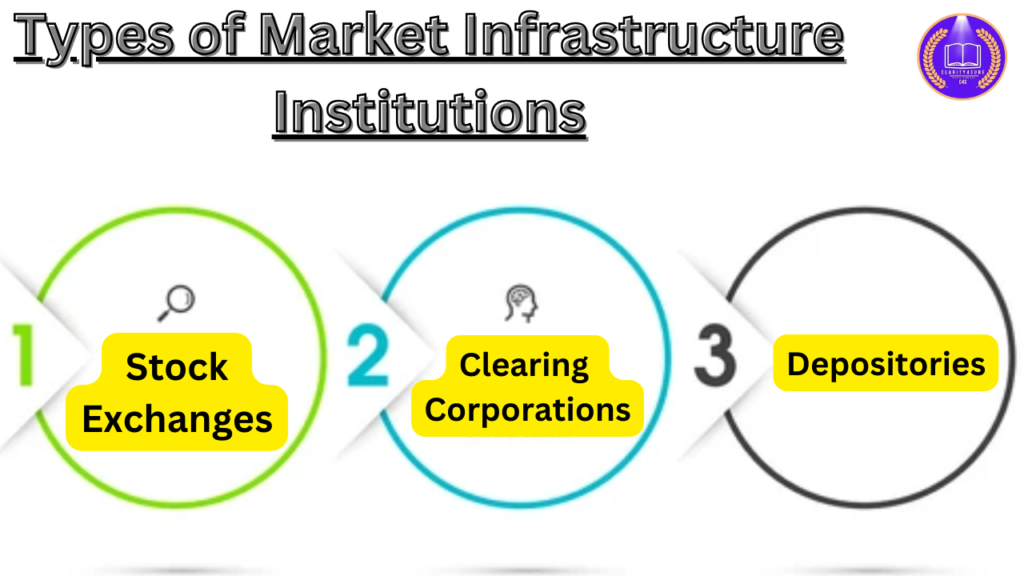Introduction
The financial markets play a crucial role in a country’s economy, ensuring smooth trading of securities, commodities, and derivatives. But behind every seamless stock trade or commodity transaction, there are key institutions that ensure transparency, security, and efficiency. These are called Market Infrastructure Institutions (MIIs).
In India, SEBI (Securities and Exchange Board of India) regulates MIIs, which include stock exchanges, clearing corporations, and depositories. These institutions act as the backbone of the financial markets, ensuring fair, efficient, and secure trading.
What are Market Infrastructure Institutions (MIIs)?
Market Infrastructure Institutions (MIIs) are organizations that provide essential facilities for trading, clearing, and settlement of financial instruments like stocks, bonds, and derivatives.
According to SEBI, MIIs include:
- Stock Exchanges (e.g., NSE, BSE) –
- Where buying and selling of securities occur.
- Clearing Corporations (e.g., NSCCL, ICCL) –
- Ensure smooth transaction settlements.
- Depositories (e.g., NSDL, CDSL) –
- Securely hold investors’ securities in dematerialized (electronic) form.
These institutions enhance market integrity, reduce risks, and build investor confidence by ensuring a transparent and well-regulated trading environment.
Why are MIIs Important?
Market Infrastructure Institutions play a critical role in:
- Maintaining Market Integrity –
- They ensure fair and transparent trading practices.
- Reducing Systemic Risk –
- Clearing corporations act as intermediaries to mitigate risks in trade settlements.
- Ensuring Investor Protection –
- Depositories securely hold securities, reducing fraud risks.
- Boosting Market Efficiency –
- Automated systems reduce delays and errors in trading.
- Strengthening Economic Growth –
- A robust market attracts investors, contributing to economic development.
Without MIIs, financial markets would be chaotic, increasing fraud risks and inefficiencies.
Types of Market Infrastructure Institutions (MIIs)

1. Stock Exchanges
A Stock Exchange is a marketplace where stocks, bonds, derivatives, and other securities are bought and sold.
Key Stock Exchanges in India
- National Stock Exchange (NSE) –
- India’s largest exchange by trading volume.
- Bombay Stock Exchange (BSE) –
- Asia’s oldest stock exchange.
- Multi Commodity Exchange (MCX) –
- Deals in commodity trading (gold, silver, crude oil, etc.).
- India International Exchange (India INX) –
- India’s first international exchange in GIFT City.
Functions of Stock Exchanges
- Facilitating buying and selling of financial instruments.
- Ensuring price discovery based on demand and supply.
- Regulating trading practices for fairness and transparency.
2. Clearing Corporations
A Clearing Corporation acts as a mediator between buyers and sellers to ensure trade settlement without risks.
Key Clearing Corporations in India
- National Securities Clearing Corporation Limited (NSCCL) –
- Handles clearing for NSE.
- Indian Clearing Corporation Limited (ICCL) –
- Manages BSE trade settlements.
- Multi Commodity Exchange Clearing Corporation (MCXCCL) –
- Clears and settles commodity trades.
Functions of Clearing Corporations
- Guaranteeing trade settlements by eliminating default risks.
- Reducing counterparty risk by acting as a buyer to every seller and a seller to every buyer.
- Managing collateral and margins to safeguard financial transactions.
3. Depositories
A Depository is a financial institution that holds securities in electronic (demat) form to ensure safety and easy access.
Major Depositories in India
- National Securities Depository Limited (NSDL) – India’s first depository, primarily serving NSE transactions.
- Central Depository Services Limited (CDSL) – Another key depository handling BSE transactions.
Functions of Depositories
- Converting physical shares into demat form.
- Ensuring safe and secure storage of securities.
- Reducing risks of fraud and forgery in securities trading.
- Enabling paperless and faster transactions.
Regulatory Framework for MIIs in India
The Securities and Exchange Board of India (SEBI) regulates and supervises MIIs to ensure fair and transparent operations.
Key SEBI Regulations for MIIs:
- SEBI (Stock Exchanges and Clearing Corporations) Regulations, 2018 –
- Governs stock exchanges and clearing corporations.
- SEBI (Depositories and Participants) Regulations, 2018 –
- Regulates depositories and their functioning.
- SEBI’s Governance Framework for MIIs –
- Ensures MIIs operate with integrity, efficiency, and investor protection.
Role of SEBI in Regulating MIIs
- Licensing and approval –
- No MII can operate without SEBI’s approval.
- Ensuring compliance –
- MIIs must follow SEBI’s risk management and governance standards.
- Protecting investors –
- SEBI ensures MIIs prevent unfair trade practices.
How MIIs Impact Investors?
1. Ensuring Smooth & Secure Trading
Stock exchanges provide a transparent platform where investors can buy and sell securities with confidence.
2. Reducing Counterparty Risks
Clearing corporations ensure every trade is settled, eliminating the risk of payment default.
3. Safeguarding Securities
Depositories allow investors to store shares electronically, making transactions faster and safer.
4. Lowering Transaction Costs
By automating processes, MIIs reduce brokerage and settlement charges, benefiting retail investors.
5. Enhancing Market Transparency
MIIs ensure real-time price discovery, helping investors make informed decisions.
Challenges Faced by MIIs
Despite their importance, MIIs face several challenges:
- Cybersecurity Risks –
- Threats like hacking and data breaches can disrupt market operations.
- Regulatory Compliance –
- MIIs must continuously adapt to new SEBI regulations.
- Operational Risks –
- System failures or technical glitches can halt trading.
- Market Volatility –
- Extreme fluctuations can strain clearing and settlement systems.
To tackle these, MIIs invest in advanced technology, cybersecurity, and regulatory compliance.
Conclusion
Market Infrastructure Institutions (MIIs) are the foundation of India’s financial markets, ensuring seamless trading, secure settlements, and investor protection. Stock exchanges, clearing corporations, and depositories work together to maintain market integrity, transparency, and efficiency.
With SEBI’s regulatory oversight, MIIs continue to evolve, embracing new technologies like AI, blockchain, and automated trading to enhance market security and efficiency.

















